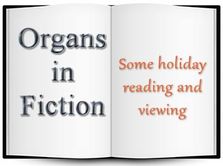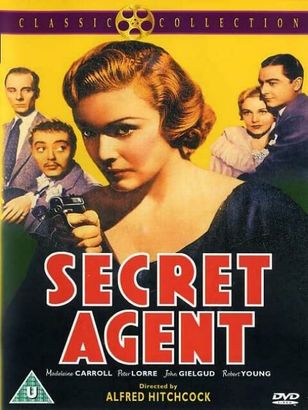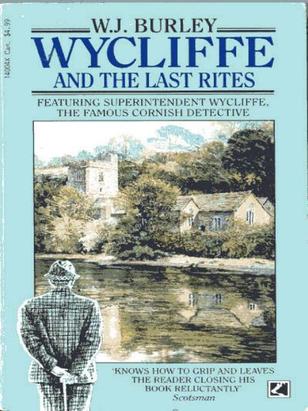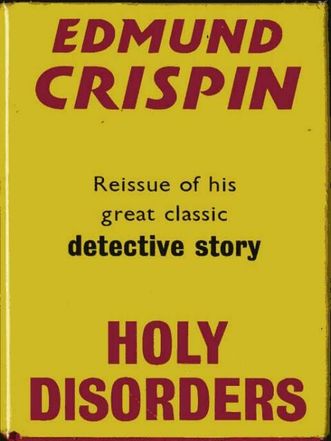|
In the Alfred Hitchcock film, Secret Agent, two spies visit a Swiss village church where they are to receive a message from the church organist, who is also an agent.
Investigating the sinister, droning discord heard as they approach the building, they find the organist dead and collapsed across the keys. They pull him upright; a typical Hitchcock touch is the momentary change in intensity of tone when his hand falls to a lower manual, then silence as the body falls to the floor. This is early Hitchcock, dated but promising, and of necessity using visual effects of a standard well below those of the James Bond era.
|
|
Similar events occur in WJ Burley's novel Wycliffe and the Last Rites. A vicar, entering his church, hears "a sustained chord of discordant notes" from the organ and finds a young woman sprawled, dead, across the chancel steps. The notes tenor A, Bb, middle e and g and treble g have been wedged down on the Great. Prolific clues throw suspicion on everyone except the real murderer in a community astir with strange undercurrents. The book is as full of red herrings as a fish shop (can organ keys become red-herrings?). Your reviewers will feel sympathy with any readers whose tolerance of being misled occasionally becomes somewhat strained.
|
Sound where there should be silence - now silence where there should be sound. In Edmund Crispin's first detective novel, The Case of the Gilded Fly there is, unexpectedly, no organ introduction to the last hymn at Evensong in an Oxford college chapel. (Philip Bailey asserts, uncharitably, that the organist had probably dozed off during the sermon.) The choir sings unaccompanied and the organist is found in the organ loft with his throat cut. Unlikely combinations of stops are drawn; initial letters prove to spell the name of the assailant.
An oddity here is that Crispin chose "Euphonium" to provide letter "E". Whilst this has appeared as a register, very rarely, one of the much more numerous stops often prefixed by "Echo" - Bourdon, Gamba, Dulciana etc - would have been a more obvious choice. The Gilded Fly was referred to by Crispin's friend, the poet Philip Larkin, as The Gelded Fly. In the United States such confusion was avoided: the book was published there as Death in Oxford.
An oddity here is that Crispin chose "Euphonium" to provide letter "E". Whilst this has appeared as a register, very rarely, one of the much more numerous stops often prefixed by "Echo" - Bourdon, Gamba, Dulciana etc - would have been a more obvious choice. The Gilded Fly was referred to by Crispin's friend, the poet Philip Larkin, as The Gelded Fly. In the United States such confusion was avoided: the book was published there as Death in Oxford.
|
There is also silence when there should be sound in Crispin's Holy Disorders; again an organist - this time of a West Country cathedral - has been murdered ; attempts are then made on the life of his intended substitute. The organ at "Tolnbridge" is described as "a four-manual Willis, one of the finest in the country [with] a horn stop which really sounded like a horn, a lovely stopped diapason on the choir, a noble tuba, a thirty-two foot on the pedals which in its lower register sent a rhythmic pulse of vibration through the whole building, unnerving the faithful." The author's customary wealth of classical, historical, musical and literary allusion is found, together with a varied cast of eccentric characters. More commonplace than some is the Methodist keeper of a beer-house who has an extensive knowledge of the music of the Anglican liturgy! Exuberance in narration more than compensates for some creaking of the plot.
|
Joanna Trollope's The Choir, popular in both book and television adaptation form, is based on the financial and moral problems faced by churches in maintaining cathedrals, choirs and organs. Her characters are certainly convincing; some critics have suggested that whilst events in her books are predictable, she nevertheless manages plenty of surprises. In Kate Charles' Book of Psalms series, blood, clerical and lay, flows freely. Organs, to stretch metaphors, have only walk-on parts or are used as pawns in ecclesiastical politics. The author - an American who lives in Ludlow, England - certainly understands the strains in modern Anglican life.
For some, a ghost story is essential at Christmas. Frank Baker's Miss Hargreaves may or may not be a ghost - we are still not sure. Norman Huntley, lay-clerk and organ scholar at a West country cathedral fills in idle moments during a holiday by inventing an elderly lady, Constance Hargreaves, adding details of character, habit and dress as imagination gets to work. Even the correct pronunciation of her name as "Hargrayves" and the extraordinary hats she wears are worked into the picture. On his return to cathedral duties she is forgotten . . . until a letter arrives asking him to meet her train and see her installed in a hotel. Apparently highly respectable - perhaps it's the hats - she is accepted in cathedral circles and Huntley, in increasing difficulty, has to devise a solution. Later editions of the book include complete verses by the lady which are quoted only in part in the original text. As a bonus the book is full of matters of organistic interest.
For some, a ghost story is essential at Christmas. Frank Baker's Miss Hargreaves may or may not be a ghost - we are still not sure. Norman Huntley, lay-clerk and organ scholar at a West country cathedral fills in idle moments during a holiday by inventing an elderly lady, Constance Hargreaves, adding details of character, habit and dress as imagination gets to work. Even the correct pronunciation of her name as "Hargrayves" and the extraordinary hats she wears are worked into the picture. On his return to cathedral duties she is forgotten . . . until a letter arrives asking him to meet her train and see her installed in a hotel. Apparently highly respectable - perhaps it's the hats - she is accepted in cathedral circles and Huntley, in increasing difficulty, has to devise a solution. Later editions of the book include complete verses by the lady which are quoted only in part in the original text. As a bonus the book is full of matters of organistic interest.
The moral is - don't give your imagination too free a rein when on holiday. There's plenty of good fiction by others without the attendant danger. All the books suggested here have been published - some many times - in both hardback and paperback and these are usually available from on-line bookshops.
Dramatisations of Secret Agent, Wycliffe and the Last Rites and The Choir are available on DVD.
Dramatisations of Secret Agent, Wycliffe and the Last Rites and The Choir are available on DVD.
David Bridgeman-Sutton and Philip Bailey, December, 2010





